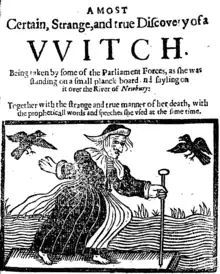Joan Wright
Goodwife Joan Wright (born c. 1596, date of death unknown), called ''Surry's Witch," is the first person known to have been legally accused of witchcraft in any British North American colony.[1][2][3][4]

Background
Wright was born around 1596 in Hull, Yorkshire, England. In 1610, she married Robert Wright, and they later emigrated to the Colony of Virginia, originally living in Elizabeth City.[5] They had two sons, William and Robert.[5] She was a self-professed healer and described as a "cunning" woman, the term used for those who practiced "low-level" or "folk" magic.[6] She was also left-handed, which deemed her untrustworthy and suspicious by the day's standards.[7] Wright lived and worked as a midwife in Surry County and was referred to as "Goodwife Wright".[2]
Witch trial
In 1626, the Allington family refused to have Wright as their midwife because she was left-handed.[8] The mother fell ill with a breast infection and the newborn baby died shortly after it was born. Quickly, the family and neighbors began to accuse Wright of the infant's demise.[9]
On September 11, 1626, Wright was called before the General Court of Virginia in Jamestown, Virginia on the charge of witchcraft.[10][11] The presiding judge of her hearing was Sir George Yeardley, the Colonial Governor of Virginia.[12] The formal accusation and investigatory hearing of Wright is the earliest witchcraft allegation on record against an English settler in any British North American colony.[13]
The court heard extensive testimony during the inquiry. Her accusers claimed that she had cursed their local livestock and crops, caused a heavy rainfall, bewitched their butter churns, accurately predicted the deaths of several of her neighbors, and cast a spell that caused the death of a newborn baby.[14] During the inquiry, Wright did nothing to dispute the charges of witchcraft, and, in some instances, subtly encouraged this belief.[2]
Outcome
It is believed that Wright was acquitted despite her admission that she did possess basic knowledge of witchcraft practices.[15][12] In her response to her charges, she remarked, "God forgive them."[16] Available court records do not describe how the hearing ended, and there is no surviving record of a sentence.[17]
Legacy
A Virginia witch trial loosely based on the story of Joan Wright is featured in a 2017 episode of the British drama television series Jamestown.[18]
In 2019, an original play, "Season of the Witch" premiered at the Jamestown Settlement. The play is a dramatic retelling of the witch trials in Virginia, with a focus on the story of Wright.[19]
References
- "Witchcraft and gossip: Jamestown Settlement explores English women's interactions with the law in colonial era". Daily Press. 10 September 2019. Retrieved 2022-10-23.
- Hudson, Carson. "Witchcraft in Colonial Virginia," The History Press, Charleston, S.C., 2019
- Miller, Rachel Wilkerson (31 October 2014). "8 Historical Witches You Need To Know This Halloween". BuzzFeed. Retrieved 2022-10-31.
- zJ3R7BMqJk (2020-06-15). "Something Wicked, This Way Comes - to Virginia. - St. Luke's Historic Church & Museum | Blog". St. Luke's Historic Church & Museum. Retrieved 2022-10-31.
- Hotten, John Camden (1874). The original lists of persons of quality; emigrants; religious exiles; political rebels; serving men sold for a term of years; apprentices; children stolen; maidens pressed; and others who went from Great Britain to the American Plantations, 1600-1700 : with their ages and the names of the ships in which they embarked, and other interesting particulars; from mss. preserved in the State Paper Department of Her Majesty's Public Record Office, England. Robarts - University of Toronto. London : Hotten. p. 261.
- Jr, James E. Seelye; Selby, Shawn (2018-08-03). Shaping North America: From Exploration to the American Revolution [3 volumes]. ABC-CLIO. p. 1033. ISBN 978-1-4408-3669-5.
- Davis, Richard Beale (April 1979). "The Devil in Virginia in the Seventeenth Century". The Virginia Magazine of History and Biography. Richmond, VA: Virginia Historical Society. 65 (2): 131–47.
- The Enemy Within: 2,000 Years of Witch-Hunting in the Western World by John Demos.
- "The witching of the Virginia midwife: The state's thorny historical past with the occupation - VPM Information - Virginia Daily Press". 2022-10-31. Retrieved 2022-10-31.
- "Joan Wright, Surry's Witch". Surry County, VA Historical Society. 22 January 2019. Retrieved 2022-10-31.
- Virginia. Council cn; Virginia. General Court cn; McIlwaine, H. R. (Henry Read); Virginia State Library cn (1924). Minutes of the Council and General court of colonial Virginia, 1622-1632, 1670-1676, with notes and excerpts from original Council and General court records, into 1683, now lost. University of Pittsburgh Library System. Richmond, Va. [The Colonial Press, Everett Waddey Co.]
- "General Court Hears Case on Witchcraft (1626)". Encyclopedia Virginia. Retrieved 2022-10-31.
- Underwood, Amanda (2019-05-13). "Witchcraft in the American Colonies Beyond the Limits of Salem". Fairmount Folio: Journal of History. 19.
- General Court. General Court Hears Case on Witchcraft (1626). (2020, December 07). In Encyclopedia Virginia. https://encyclopediavirginia.org/entries/general-court-hears-case-on-witchcraft-1626 .
- Meyers, Debra; Perreault, Melanie (2014-07-16). Order and Civility in the Early Modern Chesapeake. Lexington Books. p. 40. ISBN 978-0-7391-8975-7.
- Court, General. "General Court Hears Case on Witchcraft (1626)". Encyclopedia Virginia. Retrieved 2022-10-23.
- Preyer, Kathryn. "Penal Measures in the American Colonies", The American Journal of Legal History, Vol. 26, No. 4 (Oct. 1982), pp. 326-353. Published by: Oxford University Press. (Accessed 13 Jan 2021)
- "Meet Real Women From Jamestown's History". Org. 2019-06-27. Retrieved 2022-10-23.
- "Witchcraft and gossip: Jamestown Settlement explores English women's interactions with the law in colonial era". Daily Press. 10 September 2019. Retrieved 2022-10-23.